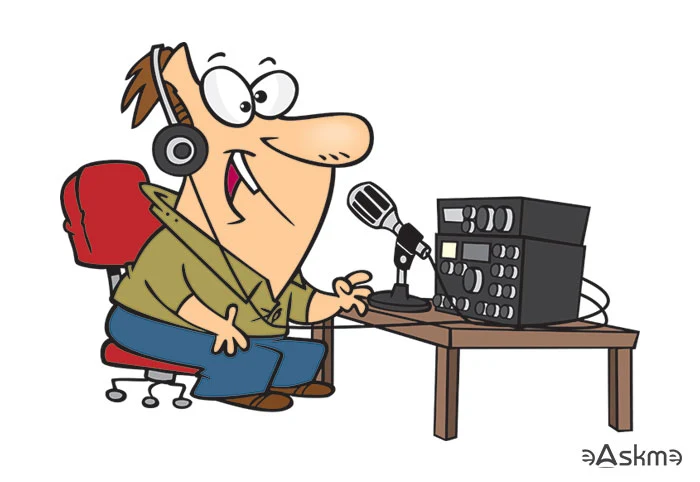Radio is something we take for granted. We listen to it in the car and at home, and we enjoy music and talk shows regularly.
But radio is much more than that. Intriguingly, radio in commercial terms is only 101 years old – the first broadcast was made in 1920 – so it is still a young phenomenon.
But surely radio has less importance now, in a world of digital communication media?
 |
| How to Troubleshoot Most Often Ham Radio Problems?: eAskme |
In some ways, it does, but there is still a requirement for radio as a communication medium.
For example, shortwave radio transmissions are the staple of the airline industry, and this is also true in the maritime world.
Short wave is the preferred communication method for much of the world's military and emergency services.
There are commercial stations still broadcasting on shortwaves to reach places other media cannot – the BBC's World Service is a prime example.
Then there are the many thousands of enthusiastic users of amateur or ham radio as a hobby ham radio is an engaging and fascinating one that remains very popular.
But that's not its only use.
In remote locations with no access to the Internet and no mobile phone signal, a short wave ham radio can be the sole method of keeping in touch.
Let's have a quick look at ham radio, who uses it, and common problems that may occur.
What is Ham Radio?
These allow people to transmit and receive while on the move.
However, true enthusiasts will have their own 'radio shack' from which they operate, where their equipment is based.
Ham radio is an amateur non-broadcast radio mainly focused on users who want to talk to others in different parts of the world.
It is a fun hobby that can be quite rewarding, and while you do need to take exams to get a license, they are relatively simple.
Who Uses Ham Radio?
The fact is that many people use amateur radio for different purposes.
One is not permitted to broadcast radio 'shows,' which is confined mainly to one-on-one conversations.
The people who use ham radio may not need to be technical or nerdy; it could also be just for fun.
Others have ham radio because they live or work in remote locations where it may be the sole method of communication.
Ham radio is particularly popular in the developing world, where the Internet has yet to arrive.
Ham radio involves various equipment and certain knowledge of how it works.
There is also widely used ham radio jargon that allows for communications to be quicker by sending messages in shorter 'coded' sentences.
Let's look at the common problems experienced by ham radio users and what can be done to rectify them.
The Main Problems Ham Radio Users Experience:
Ham radio users experience problems in three main areas: Radio Frequency (RF) problems, power problems, and operational problems.
Let's look at the most often seen problems in each area.
RF Problems
RF problems are usually those associated with the system and equipment itself, for example, poor or missing cables and equipment such as inoperative antenna and bad connections.
The usual troubleshooting routine for this type of problem includes the following:
- Replace cables and adapters one at a time if you have spares that you know work.
- Note which combinations of switching devices and antennas seem to work and which don't. See whether the problem is common to a set or piece of equipment or specific cables.
- Bypass or remove switches, relays, or filters. Leave yourself a note to put the device back in.
- Check through antenna feed lines. Consider whether the antenna feed point has a DC connection, such as a tuning network or impedance-matching transformer.
This trial-and-error approach is often the only one that works and highlights the need for users to understand the equipment. Next, let's talk about power problems.
Power Problems
Power problems occur similarly to the above when the power is not getting to the transmitter or receiver.
This can be a simple problem such as faulty switches, and the routine for troubleshooting includes:
- Check for low output voltage. Low voltage, especially when transmitting, can cause radios to exhibit strange behavior. Low voltage can also result in low power output or poor RF stability (chirpy, drifting, or raspy signals).
- Check the supply with both AC and DC meter ranges. Hum on your signal can mean a failing power supply or battery.
- If you suspect a poor connection, measure the voltage at the load (such as the radio) and work your way back to the supply. Poor connections in a cable or connector cause the voltage to drop under load.
Operational Problems
Operational problems are usually the operator's fault who has perhaps failed to switch the system on the problem, has miskeyed messages or a call sign, and is not correctly communicating with the outside world.
There can also be the very common interference problem from computers and other electrical equipment, and even metal items close to the radio equipment.
In these cases, it is trial and error again by moving items one at a time to discover the problem.
Computers, microwaves, and other RF transmitting equipment, including smartphones, are usually the cause of interference with ham radio.
Conclusion:
Ham radio is used to contact the outside world with surprising numbers of people.
Many times has come to the rescue in crises such as natural disasters in which all other communication methods have failed.
If you're interested in becoming a ham user, it is a great way to make new friends and learn new skills, so check those reviews, take the basic test, and buy a cheap hand-held radio to begin with.
Still have any question, do share via comments.
Share it with your friends and family.
Don't forget to join the eAskme newsletter to stay tuned with us.
Other handpicked guides for you;










